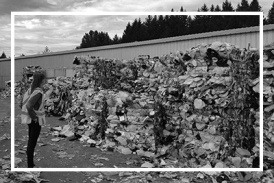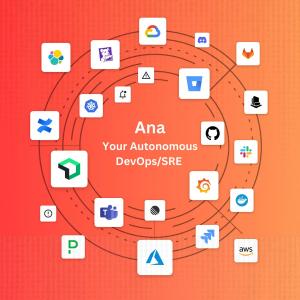OpenAna launches First Agentic Autonomous Engineer Transforming DevOps, SRE, and Cloud Operations
OpenAna introduces the first Autonomous Engineer for end-to-end DevOps, SRE, and cloud reliability beyond AI assistants and manual toil.
Ana operates across an integrated ecosystem—spanning observability, incident management, CI/CD, collaboration, infrastructure as code, and cloud providers—making it a dependable team member embedded within the stack, not just another tool.
Many enterprises are shifting from legacy operations that rely on manual scripts, alert-centric workflows, and siloed teams, toward platforms that support autonomous action, unified collaboration, and proactive reliability engineering. Ana is built for this shift, offering an agentic system that builds, scales, hardens, and remediates infrastructure without requiring human coordination.
With the growing complexity of digital infrastructure, organizations are increasingly embracing automation to maintain system uptime and developer productivity. According to Gartner, by 2025, 70% of enterprises will adopt AI-driven DevOps workflows, and over 80% of operations teams will require automation to maintain performance in hybrid environments. OpenAna’s latest release reflects this shift by expanding Ana’s core capabilities to include multi-agent task coordination, deep system context awareness, and dynamic remediation logic.
Unlike AI tools that assist with single-point tasks, Ana functions as an autonomous software engineer—able to understand, act, and execute across integrated enterprise systems. It proactively manages infrastructure provisioning, detects and resolves incidents, prevents drift, optimizes cost, and enforces compliance without relying on human intervention.
Key Enhancements Now Available in Ana
1. Autonomous SRE Operations – Performs full-cycle incident triage, RCA, and resolution across services and infrastructure.
2. Intelligent IaC Management – Dynamically generates and modifies Terraform, Helm, and Kubernetes configs based on system state.
3. Cloud & Infrastructure Automation – Controls resource provisioning, scaling, cost optimization, and secret rotation.
4. Incident-Aware Deployment Pipelines – Monitors CI/CD processes and applies real-time fixes or rollbacks to mitigate risks.
5. Built-in Compliance & Observability Controls – Maintains audit and telemetry alignment via integrations with Prometheus, OpenTelemetry, and cloud-native security tools.
6. Adaptive System Learning Engine – Builds institutional memory to prevent repeat failures and continuously improve reliability.
Why OpenAna’s Autonomous SRE/DevOps Engineer Stands Out?
Ana goes beyond DevOps toolchains and AI assistants. It serves as a platform-level Autonomous Engineer that takes action—not just surfaces insights. Ana works natively with dozens of enterprise systems (as shown in the integration visual) and continuously adapts to evolving infrastructure, policies, and codebases. It delivers impact across multi-cloud environments while supporting compliance frameworks like SOC2, HIPAA, and ISO.
Industry Impact: Case Examples
Retail Platform : Reduced cloud spend by 27% through real-time resource optimization and automated de-provisioning.
Financial Services Firm : Decreased change failure rate by 40% by halting faulty releases and initiating automated rollbacks.
Healthcare SaaS Vendor: Cut MTTR from hours to minutes using self-healing workflows for Kubernetes workloads.
Leadership Perspective
Rajiv Sondhi, CEO of OpenAna, commented "With increasing operational complexity, enterprises require more than AI-powered insights, they need fully autonomous solutions. Ana empowers DevOps and SRE teams to proactively manage infrastructure and resolve incidents, reducing manual workloads and improving overall system resilience."
Arsh Anwar, CTO of OpenAna, added:"AI is fundamentally reshaping DevOps and reliability engineering. Ana’s expanded capabilities ensure that enterprises can focus on innovation and scale, while trusting Ana to autonomously manage operational stability and compliance."
Future Roadmap for Ana
Advanced Root Cause Prediction – Detecting early warning signals and correlating them with architectural patterns.
Multi-Agent Task Swarming – Launching agent clusters to investigate, fix, and verify incidents across complex environments.
Extended API and Ecosystem Integrations – Including ServiceNow, OPA, and custom policy-as-code frameworks.
Learn More
For more information about Ana’s autonomous engineering platform and how it is transforming DevOps, SRE, and infrastructure operations, visit www.openana.ai or contact at hello@openana.ai
About OpenAna:
OpenAna is the creator of Ana, the industry's first truly autonomous engineer. Ana automates the full software operations lifecycle—from infrastructure and cloud optimization to reliability engineering and continuous compliance—helping enterprises reduce toil, enhance system resilience, and ship faster.
Rajiv Sondhi
OpenAna.ai
email us here
Legal Disclaimer:
EIN Presswire provides this news content "as is" without warranty of any kind. We do not accept any responsibility or liability for the accuracy, content, images, videos, licenses, completeness, legality, or reliability of the information contained in this article. If you have any complaints or copyright issues related to this article, kindly contact the author above.
leagend T31 Sets New Standard for Affordable and Accurate OBD II Diagnostics
Couple Opens Unique '432Hz' Live Music Sanctuary on Spain's Costa del Sol for Summer Vibes and Son Awareness
انتشار خيمۀ حسب حال راز آميز عمر خيام: بازدوزى منطقى و ترجمۀ منظوم هزار رباعى ميكدۀ سعادتش بر اساس روش هستى شناسى خود او
Kalendarium
Więcej ważnych informacji
 Jedynka Newserii
Jedynka Newserii

 Jedynka Newserii
Jedynka Newserii

Handel

Ze względu na różnice w cenach surowce wtórne przegrywają z pierwotnymi. To powoduje problemy branży recyklingowej
Rozporządzenie PPWR stawia ambitne cele w zakresie wykorzystania recyklatów w poszczególnych rodzajach opakowań. To będzie oznaczało wzrost popytu na materiały wtórne pochodzące z recyklingu. Obecnie problemy branży recyklingu mogą spowodować, że popyt będzie zaspokajany głównie przez import. Dziś do dobrowolnego wykorzystania recyklatów nie zachęcają przede wszystkim ceny – surowiec pierwotny można kupić taniej niż ten z recyklingu.
Przemysł spożywczy
Rośnie presja konkurencyjna na unijne rolnictwo. Bez rekompensat sytuacja rolników może się pogarszać

Rolnictwo i żywność, w tym rybołówstwo, są sektorami strategicznymi dla UE. System rolno-spożywczy, oparty na jednolitym rynku europejskim, wytwarza ponad 900 mld euro wartości dodanej. Jego konkurencyjność stoi jednak przed wieloma wyzwaniami – to przede wszystkim eksport z Ukrainy i niedługo także z krajów Mercosur, a także presja związana z oczekiwaniami konsumentów i Zielonym Ładem. Bez rekompensat rolnikom może być trudno tym wyzwaniom sprostać.
Transport
Infrastruktury ładowania elektryków przybywa w szybkim tempie. Inwestorzy jednak napotykają szereg barier

Liczba punktów ładowania samochodów elektrycznych wynosi dziś ok. 10 tys., a tempo wzrostu wynosi ok. 50 proc. r/r. Dynamika ta przez wiele miesięcy była wyższa niż wyniki samego rynku samochodów elektrycznych, na które w poprzednim roku wpływało zawieszenie rządowych dopłat do zakupu elektryka. Pierwszy kwartał br. zamknął się 22-proc. wzrostem liczby rejestracji w ujęciu rocznym, ale kwiecień przyniósł już wyraźne odbicie – o 100 proc.
Partner serwisu
Szkolenia

Akademia Newserii
Akademia Newserii to projekt, w ramach którego najlepsi polscy dziennikarze biznesowi, giełdowi oraz lifestylowi, a także szkoleniowcy z wieloletnim doświadczeniem dzielą się swoją wiedzą nt. pracy z mediami.









.gif)

 |
| |
| |
|